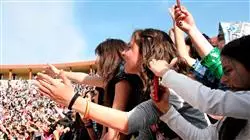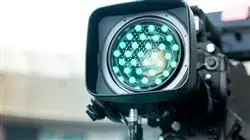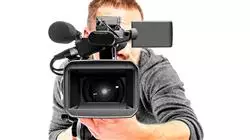University certificate
Scientific endorser

The world's largest faculty of journalism and communication”
Description
Incorporate your professional tools, techniques and ways of working in Specialized Sports Journalism, into the mastery of a form of communication that operates with its own communicative keys"

Sports Journalism is a unique phenomenon that has developed in Spain in an extraordinary way in recent years, even to the point of becoming not only the specialized journalism field with the most headlines in the country, but also one of the star sections of the most important print and digital newspapers, as well as of the programming of the main radio and television media.
The large volume of journalism of this type makes it today the most consumed and demanded product. Consequently, it has the largest impact on what citizens say and do, especially among the youngest, who are great sports fans and tend to emulate their idols by adopting certain expressive and behavioral patterns.
In its evolutionary process, this type of journalism has created its own style, based on the originality and spectacle of its proposals, and has provided a new model for the presentation of information through a language that is visually attractive, common and easily accessible to all audiences.
Therefore, it displays notable strengths, such as its universality and ability to set trends and fashions, its increasing presence in dictionaries, and the development of its own differentiated language that contributes to the evolution of the language. Also, this type of journalism has earned itself a better consideration from linguistic institutions for its ability to innovate and create new words, expressions and meanings.
This program exposes the key elements to take advantage of the possibilities offered by a website: live digital broadcasts, social networks, blogs, the creation and management of a digital identity, audience measurement systems and advertising strategies.
It specializes professional journalists in social media so that they can practice their profession in collaborative settings and adapt to the changing environment that has marked new social media networks.
The proven experience of TECH is here to help in this comprehensive program"
This postgraduate diploma in Specialized Sports Journalism contains the most complete and up-to-date program on the market. The most important features include:
- The latest technology in online teaching software
- A highly visual teaching system, supported by graphic and schematic contents that are easy to assimilate and understand
- Practical cases presented by practising experts
- State-of-the-art interactive video systems
- Teaching supported by telepractice
- Continuous updating and recycling systems
- Autonomous learning: full compatibility with other occupations
- Practical exercises for self-evaluation and learning verification
- Support groups and educational synergies: questions to the expert, debate and knowledge forums
- Communication with the teacher and individual reflection work
- Content that is accessible from any fixed or portable device with an Internet connection
- Banks of complementary documentation are permanently available, even after the Postgraduate Diploma
A postgraduate diploma supported by the best technology, which will allow you to learn in a fluid and efficient way"
The team of Professors in this postgraduate diploma in Specialized Sports Journalism have extensive experience in teaching at university level, both in undergraduate and graduate programs, and extensive experience as working professionals, which allows them to know, first hand, the profound transformation undergone by the communication sector. Their direct experiences, their knowledge and the analytical capacity of those who hold a managerial position are the best source to grasp the key to the present and the future of a vocational and exciting profession for those who love sports and communication.
The methodology of the programs offered at TECH Global University, in an online format, allows students to break down the barriers imposed by work obligations and the difficult balance between work and personal life. Accessing face-to-face learning is practically impossible for those who are involved in the daily demands of work.
All this educational summary makes this program, a qualification of specialization in Specialized Sports Journalism, comply with all the aspects that are relevant and essential to turn the Journalism professional into a real expert in the fields related to Specialised Journalism.
Educate yourself in one of the most interesting fields of journalism with the security of the world's largest online university in Spanish"

With professors who are experts in this area of work, this program is a unique opportunity for professional development"
Objectives
The program in Specialized Sports Journalism is aimed at obtaining a degree of specialization that allows a journalism professional to develop their career in this field in an optimal way. For this purpose, we have developed the essential theoretical content that will serve as a foundation for the practice, which will be developed intensively throughout the program.

Specialized language, the use of data, the relationship and management of information sources; you will learn everything you need to create quality sports news content"
General Objectives
- Offer the key to the correct use of the language of sports
- Make known the diversity of terminology in the world of sports
- Apply knowledge on the use of language to journalistic writing of chronicles, news, reports or interviews
- Analyze the impact of sport on society
- Acquire in-depth knowledge of sports organizations
- Define the functions of the communication departments of sports companies
- Examine the changes in the management of sports companies
- Define the different areas of sports organizations
- Address the development of marketing and advertising in sports
- Delve in the history of sport
- Compile the essential terminology for the handling of audiovisual contents offered on television
- Expose all the internal and external agents involved in the broadcasting of a sporting event
- Evaluate the similarities and differences between television and radio in the broadcasting of a sporting event
- Develop the techniques that allow the use of the voice as a tool, applying the rhythm and intonation required for television
- Specify how a television sports newsroom works and how its different members interact with each other
- Demonstrate the importance of broadcasting rights and the power that television has in decision making when organizing a sporting event
- Interpret audiences and the effect of technology on viewers, who have moved away from their passive role
- Assess the figure of the sports presenter on television, the techniques and tools available to them, and the way they 'act' according to the type of program
- Define the elements involved in the recording, editing, montage and postproduction of a television video
- Develop skills for an optimal distribution of multi-sport contents
- Acquire advanced knowledge of the sports disciplines with the greatest media projection
- Analyze the fundamentals of almost fifty other disciplines to reinforce a comprehensive overview of multisport aspects
- Examine the most recommendable guidelines when approaching the news report and other journalistic genres (to cover these sports)
- Generate specialized knowledge on regulations and strategies … that subsequently enrich journalistic pieces
Specific Objectives
Module 1. Sports Language
- Study the importance of sports language in the context of common language
- Know the etymology and use of sports words
- Study the presence of words and expressions from the language of sports in other areas and news sections
- Analyze the contribution of sports journalistic language and its innovations (neologisms) in the evolution of dictionaries
- Understand the most common lexical and semantic errors made in everyday sports journalism
- Know and analyze foreign terms used in the world of sports
- Analyze the most common rhetorical resources in sports journalistic discourse
- Use and study how sports language is included in glossaries and style books of journalistic media, as well as other resources available online for the correct use of the language
Module 2. Online or Digital Sports Journalism
- Master the methodology and techniques used by the online media
- Analyze how to manage social media strategies
- Start a business and manage your personal brand
- Develop a Community Manager specialized knowledge to manage communicationwith the audience
- Structure, organize and make the most of the spaces on a website
- Determine the styles of narrative journalism
Module 3. Data and Investigative Journalism
- Analyze sports from a Data Journalism perspective
- Select appropriate data sources for specific statistical news items
- Support information or opinions with relevant data
- Compile, process, manage, filter and compare statistics
- Access, discriminate and publish confidential information and leaks
Module 4. Major Sporting Events
- Compile the most relevant facts in the history of major sporting events (Olympic Games, World Cups and the most important tournaments in other disciplines such as motorsports, tennis, basketball or golf) from their origins to the present day
- Evaluate the political, social, economic and cultural circumstances in which they are developed, and which give full meaning to them
- Expose the techniques, resources, skills and circumstances in which news coverage of a major event such as a World Cup, Olympic Games or Formula One World Championship is carried out
- Demonstrate how to organize a major event in its four phases (design, development, management and completion) by defining the type of event, structure and strategic objectives
- Specify the practical case of the organization of a Davis Cup tennis final, with the creation of an organizing committee, a media strategy and the organization of the press
- Demonstrate the importance of broadcasting rights and the power that television has in decision making when organizing a sporting event
- Interpret the assignment of image exploitation rights and how it directly affects the development of sports journalism
- Assess the role of women in their participation in major sporting events: from the creation of their own Games in Ancient Greece to the quest for equality today

Our goal is simple: to offer you a high-quality program, with the most developed teaching resources so that you can achieve the best results with little effort”
Postgraduate Diploma in Specialized Sports Journalism
.
Specialized sports journalism is a branch of journalism that focuses especially on coverage of events, news and analysis related to the world of sports. Specialized sports journalists have in-depth and detailed knowledge about specific sports and are trained to inform the public about the latest developments in the sporting world.Specialized sports journalism refers to coverage of sporting events and the sports industry in general, conducted by journalists who have specialized knowledge in different sports. This involves the production of accurate and quality sports content in different media.
This type of journalism covers not only news about teams and competitions in different sports, but also interesting human stories behind the athletes, the sports industry and business, and the social and cultural impact of sports on society.
Specialized sports journalists may work in different media, such as newspapers, magazines, television, radio and digital media. They use research and interviewing techniques to find accurate information and data about events and athletes, and to produce quality content for their audience. .
This virtual academic program seeks to provide students with comprehensive training in specialized sports journalism. Students will learn about the fundamentals of specialized sports journalism, its characteristics and challenges, and the ethics and responsibility inherent to this field. In addition, they will be taught about the different journalistic genres used in specialized sports journalism, writing technique and multimedia writing. The program will also focus on the coverage and production of content in specialized sports journalism, as well as digital tools and strategies for team content production. Finally, trends and challenges in specialized sports journalism will be addressed, including adapting to new technologies and formats, ethical and legal considerations, and industry perspectives. Learning will take place through theoretical and practical modules, which will include exercises, teamwork, discussions and case studies.""







